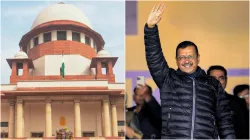Supreme Court extends stay on proceedings against Arvind Kejriwal in UP election law violation case
As the legal battle continues, the Supreme Court's intervention provided temporary respite for Arvind Kejriwal. The outcome of this case will not only impact his political standing but also set important precedents regarding election law violations and freedom of speech.

The Supreme Court has prolonged its interim stay on proceedings against Delhi Chief Minister Arvind Kejriwal in a case stemming from alleged objectionable remarks made during the 2014 Lok Sabha poll campaign in Uttar Pradesh. The case revolves around accusations of Kejriwal making derogatory comments against the BJP and the Congress.
Appeal against high court order
Arvind Kejriwal has approached the apex court challenging a decision by the Lucknow bench of the Allahabad High Court, which refused to dismiss the criminal case against him pending before a trial court in Sultanpur. The Supreme Court, represented by a bench comprising Justices M M Sundresh and S V N Bhatti, has agreed to hear Kejriwal's appeal, ensuring that the interim relief continues.
Judicial observations
During the proceedings, the bench remarked on the nature of the case, stating, "Let the interim order continue. What is all this? These are all irrelevant matters. It is not a matter for us to go into." The court's observations underscored the need for a focused legal examination of the issues at hand.
Allegations against Kejriwal
Arvind Kejriwal faced charges of promoting enmity between classes under Section 125 of the Representation of the People (RP) Act, 1951. The allegations stem from statements made during the 2014 election campaign, where he purportedly remarked, "Those who will vote for the Congress will be betraying the nation, and God will not forgive those who will vote for the BJP."
Legal arguments
In his defense, Kejriwal's plea argued that the remarks were directed at a political party and not any specific religion or caste, thus challenging the applicability of Section 125 of the RP Act. He also raised questions regarding the evidentiary basis of the case, highlighting the absence of video evidence or a full transcript of the alleged speech.
Allegations of bias
The plea further alleged bias on the part of the police, pointing out that an FIR was registered without independent inquiry and merely based on a complaint alleging a violation of the Model Code of Conduct.
Also read | Supreme Court nullifies defamation complaint against RJD leader Tejashwi Yadav